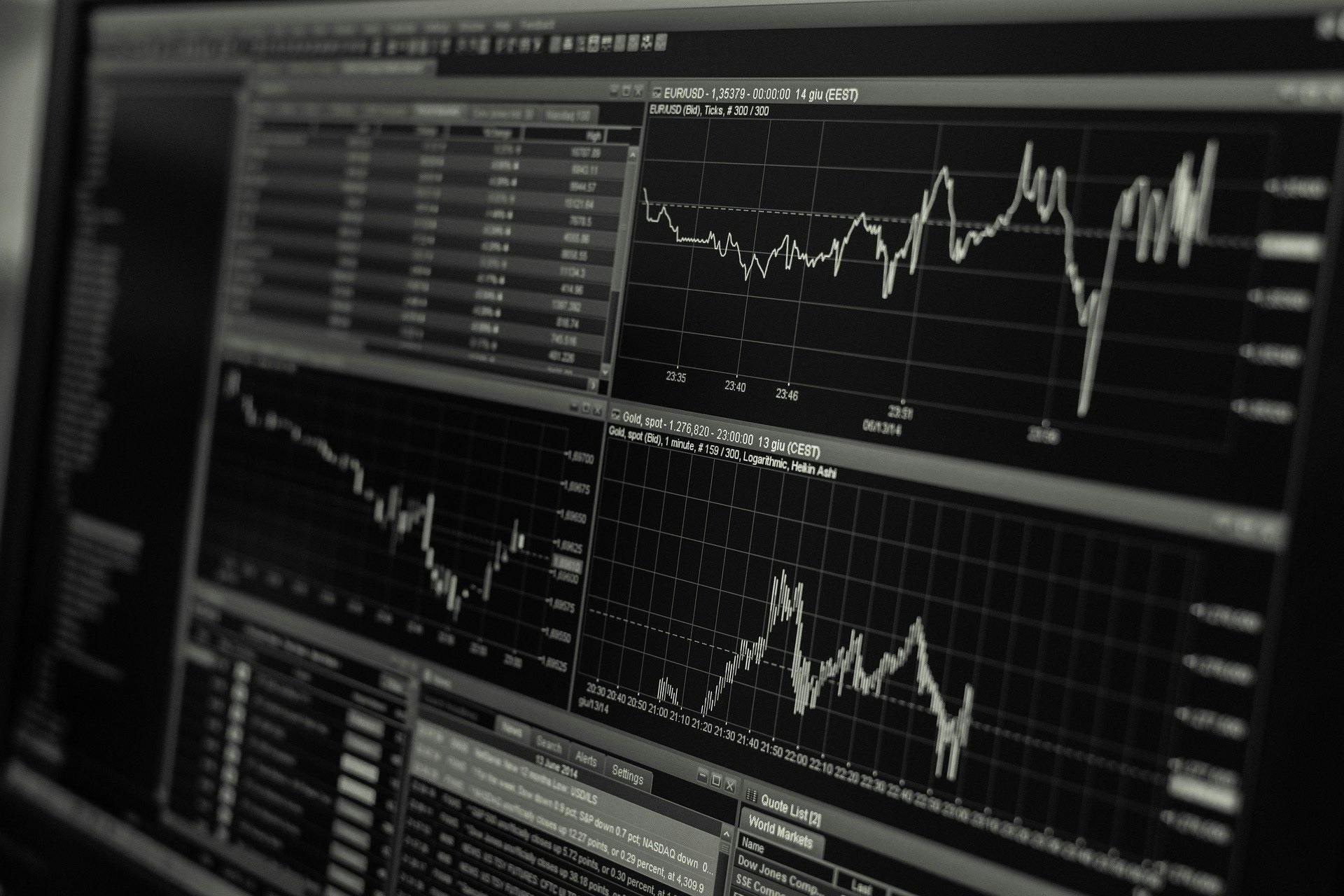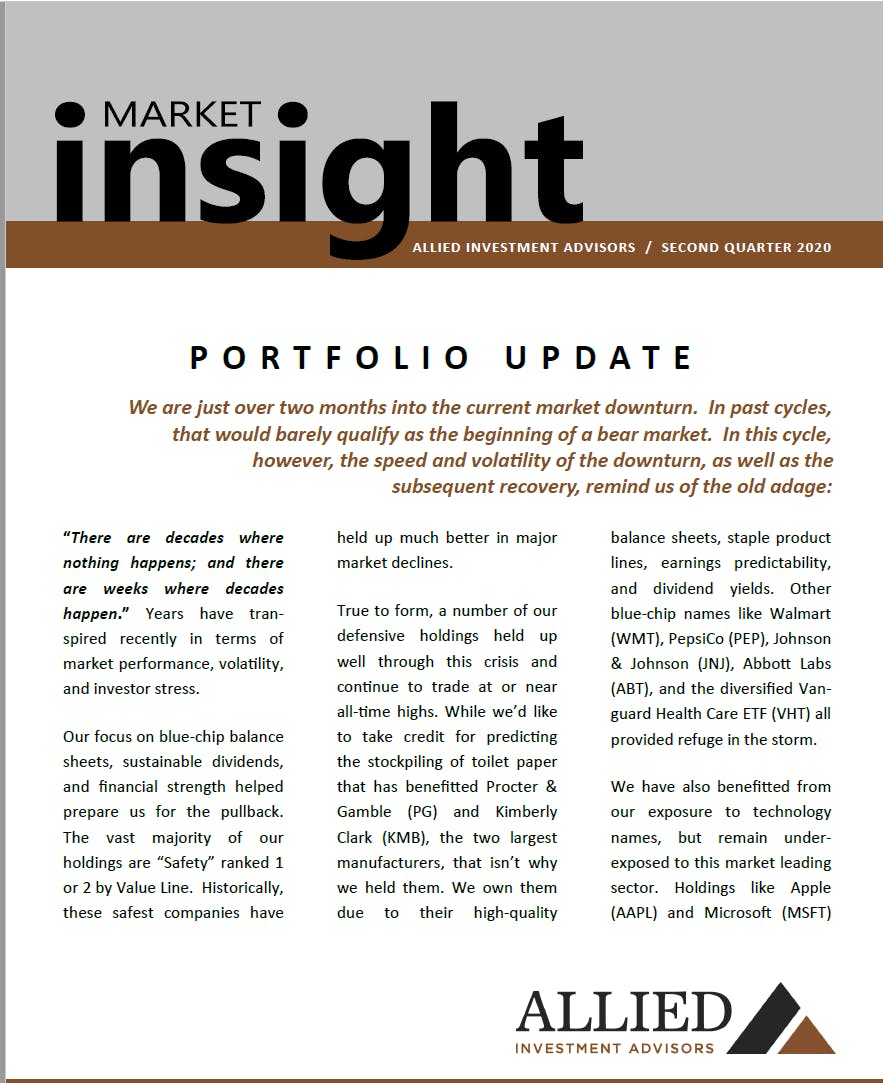Q2 2020: Portfolio Update
May 20, 2020
We are just over two months into the current market downturn. In past cycles, that would barely qualify as the beginning of a bear market. In this cycle, however, the speed and volatility of the downturn, as well as the subsequent recovery, remind us of the old adage:
"There are decades where nothing happens, and there are weeks where decades happen.” Years have transpired recently in terms of market performance, volatility, and investor stress.
Our focus on blue-chip balance sheets, sustainable dividends, and financial strength helped prepare us for the pullback. The vast majority of our holdings are “Safety” ranked 1 or 2 by Value Line. Historically, these safest companies have held up much better in major market declines.
True to form, a number of our defensive holdings held up well through this crisis and continue to trade at or near all-time highs. While we’d like to take credit for predicting the stockpiling of toilet paper that has benefitted Procter & Gamble (PG) and Kimberly Clark (KMB), the two largest manufacturers, that isn’t why we held them. We own them due to their high-quality balance sheets, staple product lines, earnings predictability, and dividend yields. Other blue-chip names like Walmart (WMT), PepsiCo (PEP), Johnson & Johnson (JNJ), Abbott Labs (ABT), and the diversified Vanguard Health Care ETF (VHT) all provided refuge in the storm.
We have also benefitted from our exposure to technology names, but remain underexposed to this market leading sector. Holdings like Apple (AAPL) and Microsoft (MSFT) continue to be market darlings. Valuation concerns, however, keep us on the sidelines and from diving deeper into similar names despite their strong momentum.

Recent volatility has provided an opportunity to add what we think is long-term value in both the stock and bond components of the portfolio. We have made adjustments to our fixed income holdings to capture more yield. With the sell-off in equities, we also took the opportunity to rebalance back to investment objectives by adding exposure in depressed high-quality names like Sysco (SYY), as well as the energy sector and financial names.
With the heightened volatility, investors flocked to the protection and safety of government bonds. This benefited our portfolios as over half of our bond exposure was in Treasuries. As people demanded Treasury bonds (pushing prices up and yields down), we were happy to sell to them and reallocate into corporate bonds.
Panicked investors fleeing corporate bonds – even very high-quality “A” rated bonds – caused yields to spike versus Treasuries (see below graph). At the depths of the pullback, some of the strongest balance sheets in the country – names like Duke Energy, Wells Fargo, and Raytheon Technologies - were trading at over a 3.0% spread to Treasuries, something we hadn’t seen since the Financial Crisis in 2009. By adjusting our bond fund holdings to overweight high-quality corporates, we were able to nearly double our fixed income yield with what we viewed as minimal risk.
Using some of the proceeds from our bond rebalancing, we were also able to move into equities at depressed prices to capture some value opportunities. While we do not try to time the market, we do rebalance portfolios on an on-going basis to take advantage of opportunities to “buy low” and “sell high” and keep accounts near their desired risk tolerance and stock/bond allocation.

One area where we found value was the energy sector. For accounts with individual stock exposure, we moved from the diversified Vanguard Energy ETF (VDE) into a basket of high-quality integrated names. These new names included Chevron (CVX), Royal Dutch Shell (RDSB), and Total (TOT), and all came with top notch safety and financial strength ratings as well as dividend yields in the high single digits or better. While these are challenging times in the energy sector, and things may get worse before they get better, we believe these companies can weather the storm and the prices are attractive.
We also added a new position in Bank of America (BAC). BofA is the largest deposit bank in America. Yet it trades today as if that deposit base is worth nothing. While people’s minds go back to the financial crisis when they think of banks, today BAC has de-risked its balance sheet and has capital ratios that are three times as high as they were in 2007. We’re not the only ones seeing value in Bank of America. In a recent interview, Warren Buffett noted he’s been buying Bank of America and feels “very good about the banks we [Berkshire Hathaway] own.”
As we’ve noted in recent communications including our Market Volatility Special Update and From Bull to Bear Recovery Special Update, we don’t know if we’ve seen the lows for this bear market or if new highs are on the way, but we are very happy with our current portfolio. The defensiveness of our core holdings, combined with the value opportunity of our latest additions give us confidence that, no matter what the market throws at us, we are well positioned for the long-term.
If you have any questions about your account(s), the recent changes made to the portfolio, or if there has been a change in your financial situation or investment objectives, please feel free to contact any member of our team to schedule a meeting.

